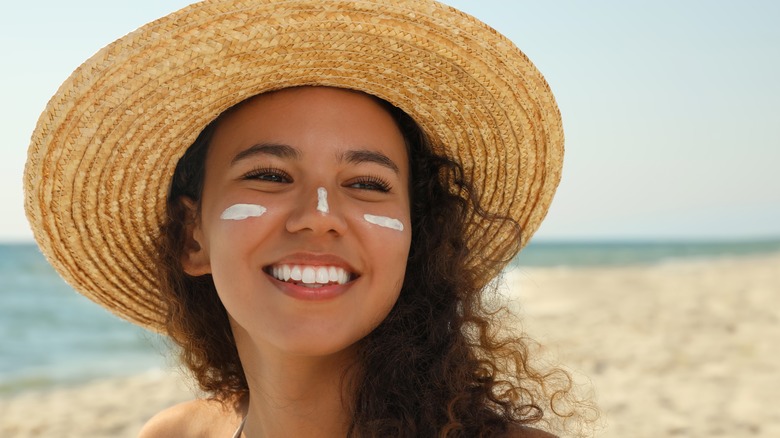You're Probably Not Protecting Yourself From The Sun As Well As You Think
With the summer months looming upon us, you might think that getting a little extra glow on your skin might be fine, but according to the American Academy of Dermatology (AAD), no tan is safe because it damages the DNA on your skin. This damage, over time, can lead to skin cancer. According to the National Council on Skin Cancer Prevention, skin cancer is the most widespread cancer in the United States, affecting one out of every five people at some point. The deadliest form of skin cancer, melanoma, is twice as likely to occur if you've had more than five sunburns.
An April 2022 study from the AAD found that Americans could do better to protect themselves from the sun, including understanding SPF protection. More than two-thirds of the study's respondents believed that SPF 30 sunscreen is twice as protective as SPF 15. This belief is incorrect. SPF 30 offers protection against 97% of the sun's burning UVB rays, whereas SPF 15 filters out 93%. The study also found that we often forget to reapply sunscreen after prolonged exposure to the sun.
Some ways to protect yourself from the sun
The Centers for Disease Control and Prevention (CDC) suggests taking extra precautions if the Ultraviolet (UV) Index in your area is 3 or higher. Be sure to check daily, because the UV Index can reach above 3 even in winter. In this case, the Cleveland Clinic recommends finding shade when the sun is brightest, which the CDC notes is typically between 10 a.m. and 4 p.m. in daylight saving time.
You can choose specific clothing to protect you from the sun. The Skin Cancer Foundation suggests loose-fitting apparel made with unbleached cotton to absorb the UV rays. Some high-tech fabrics can also shield your skin from the sun.
The CDC also recommends a wide-brimmed hat to protect your ears and head. Oftentimes, our hats don't cover our ears and can expose our necks. If this is the case, be sure to apply sunscreen to these typically unprotected areas. Wearing sunglasses with UVA and UVB protection can prevent cataracts.
Even if you aren't susceptible to sunburn, the Cleveland Clinic recommends sunscreen of at least 30 SPF for all skin types. Be sure to use enough sunscreen to fill a shot glass to cover all exposed areas of your body. Apply sunscreen before you head outside, and reapply at least every two hours. Finally, check the expiration date of your sunscreen. If there isn't one, toss out any sunscreen older than three years (via Mayo Clinic).


